Hideout Block Party Grows Old Gracefully With Solid Partner In A.V. Club
By Staff in Arts & Entertainment on Sep 16, 2012 8:00PM
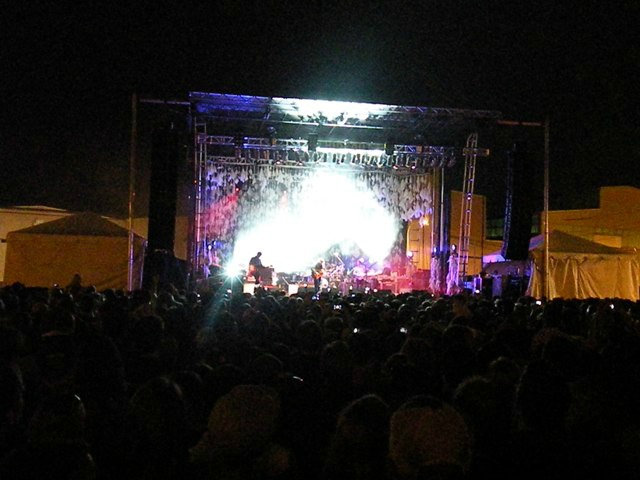
Photo credit: Chicagoist/Chuck Sudo
Some of the young’uns who drunkenly passed judgment on the patrons who brought their kids to the fest may not know (or care), but those of us who’ve been attending the Block Party for years understand. The family area has grown larger every year, with the concentration of strollers, papooses and toddler slings at the festival simply astounding to us who don’t have kids. It’s as though we’re looking at the next generation of Hideout clientele grow up before our eyes.
Frankly, that’s a good thing. Few bars in Chicago blend music, art, culture, politics, networking and developing a sense of family like Hideout. This was a point co-owner Tim Tuten consistently made in his stage introductions Saturday. (We’ll give his Friday banter a mulligan; Tuten has been out of practice for a while.) Tuten’s talk was walked by the acts that are part of the bar’s immediate family like Jon Langford and Kelly Hogan.
After years of fighting for sponsorship to keep the Block Party going, Hideout seems to have a partner who gets it in the A.V. Club, the sister publication of the Onion, whose musical and cultural tastes parallel near-perfectly with Hideout. But there were still problems with amenities. Lines for food and drink ran long and many attendees were disappointed when food trucks ran out of their wares long before the fest ended each day. Lagunitas Brewing was the sole beer sponsor this year but only set up one beer tent. Hideout itself had long lines for cocktails and canned beer when festival-goers didn’t want to wait in the sun for beer and wine.
But those are minor quibbles in what was an enjoyable, celebratory weekend.—Chuck Sudo
Recaps by Chuck Sudo (CS), Kim Bellware (KB) and Lizz Kannenberg (LK)
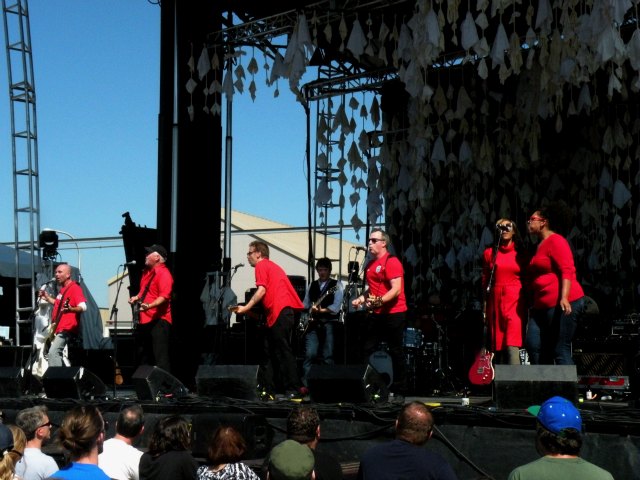
The Waco Brothers with Paul Burch (Photo credit: Chicagoist/Chuck Sudo)
After 25 minutes of musical dissonance by Guitarkestra and a Tim Tuten who didn’t have his “A”-game on band introductions, Cave kicked off Friday evening’s music lineup proper and served as a reminder that I should listen more to the bands Chicagoist’s music staff writes about. What surprised me the most about Cave was the power of its rhythm section. Bassist Dan Browning and drummer Rex McMurry can work a groove with the best Afrobeat or funk bands and make it seem as more than a “lather, rinse, repeat” cycle. With Browning and McMurry holding down the low end with the timing of an atomic clock, guitarist Rotten Milk and guitarist/keyboardist Cooper Crain provided the colorful flourishes of melody and fuzz. The crowd, then sparse, reacted enthusiastically and took advantage of the space they had around them to dance with freedom and abandon.--CS
When The War on Drugs took the stage, the goal seemed to be setting up a decidedly mellow vibe for the rest of the night. The Philly-based band has struck upon a weird but successful formula for making music that compels you to listen carefully without grabbing for the listener’s attention in obvious (or annoying) ways, which lets in room for a crackling energy that still feels relaxed. When the group is so sparse with lyrics, half the intrigue is listening to see when frontman Adam Granduciel will actually sing, and the set (following suit with most of the groups’ later music) was more ambiance and vibe than storytelling. Festival fans bummed out by the latest Dylan album probably found comfort with War on Drugs, since Granduciel will probably never escape the comparisons--particularly on songs like “Come to City,” where his voice takes on the same distinct grovel-growl. Elsewhere, the band still leans more early Springsteen than Dylan, with a psychedelic E-Street Band twist. The best part of the War On Drugs’ more psyched-out moments were that the electric noodling and distortion actually went somewhere instead of just meandering along; “indulgence” here was for fans, not the band. There weren’t waves of head boppers or fist pumpers, but it was impossible not to be deeply tuned in. —KB
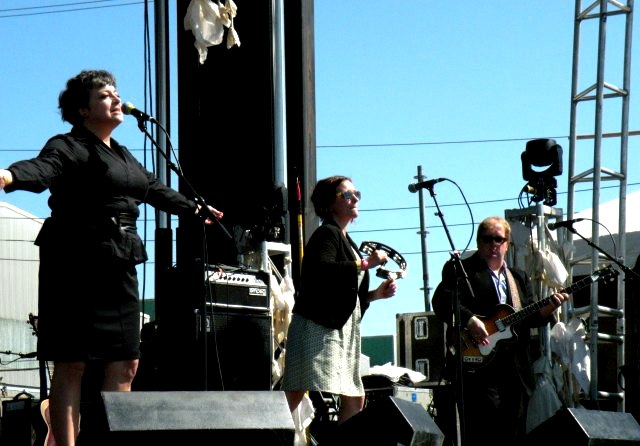
Kelly Hogan and Nora O'Connor tell the crowd why they can't have nice things. (Chicagoist/Chuck Sudo)
In some alternate, extremely literal universe, Irish folk rocker Glen Hansard would have his mug next to the Wiki entry for “sad bastard.” With a voice cracked with pain, the poor guy sounds like his heart is never not broken. But like all good sad-sack singers, Hansard was not going to harshen the collective buzz for festival goers, mixing beautiful bummers like “Love Don’t Leave Me Waiting” with a segue into Aretha Franklin’s (or Otis Redding, take your pick) “Respect.” Doing his best Northern Soul singer, Hansard went off on some kind of half-screaming aria for the soul--and awesome--purpose of showing off his brass section. Another segue into Marvin Gaye’s “Sexual Healing” didn’t captivate quite as well, but you have to give Hansard credit for trying to inject some fun and soul into his music, since they’re two things his solo work tends to lack. A few songs were so schmaltzy that Chuck and I mock slow-danced two feet apart, hands-on-shoulders, but Hansard and his band were redeemed by a completely welcome Van Morrison cover. For music that’s overly sentimental and painfully (awkwardly, even) honest, Hansard has the market on that cornered. By his choice in covers alone, Hansard has great taste: ending with a version of The Band’s “Don’t Do It,” we were happy that he did. —KB
Iron & Wine’s Sam Beam has come a long way from the soft brush vocals and squeaky, hushed guitar of the now decade-old “Creek Drank The Cradle.” Beam has energy, pop sense and a band. Even on older songs that were originally sparse, Beam and his band fleshed out tracks like “Radio War” into charging ballads. I’ve always preferred Beam stripped down, and a few times, he dialed back a few notches with the band for oldies like “Lion’s Mane.” Ten years ago Beam was probably the best of the neo-Nick Drake singer songwriters, but for festival purposes, he traded in quiet folksy ballads for harmonies, a wider range of instruments and an overall sound that was the perfect median between War On Drugs and Glen Hansard. Here and there, it sounded like Beam’s band was taking cues from world music--Afro beats, snaky, festive percussion--which took Iron and Wine’s set to some unexpected places. Still, it was a little too reminiscent of 3 a.m. highway driving music to feel like an appropriate closer for day 1, and it made us ache for the kinds of bands from Hideout Block Parties of yore (Monotonix, for example). Friday didn’t quite end with a bang, but on the upside, everyone older than 24 went into Saturday feeling like a champ! --KB
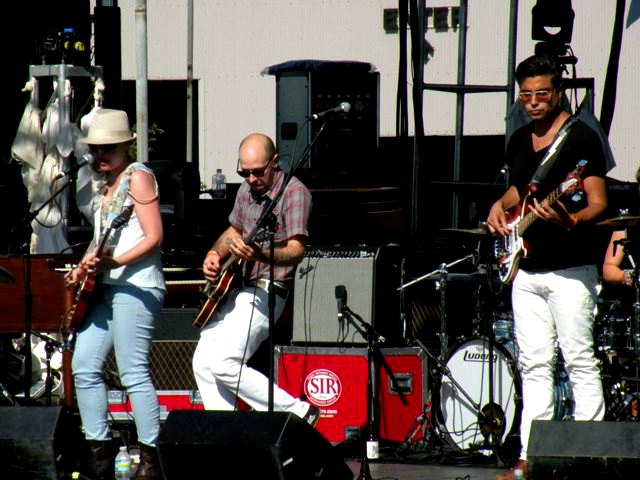
The Corin Tucker Band (Photo Credit: Chicagoist/Chuck Sudo)
Saturday’s festivities kicked off with clear skies, applying sunscreen and following the hardcore guests to the front of the stage for the twang of The Lawrence Peters Outfit, which breezed through a half-hour of country covers, Western Swing and blues anchored by the deft brushwork of frontman Lawrence Peters on snare drum. After that, The Waco Brothers with special guest Paul Burch did what they do best: turn the amps up to full volume and damn the torpedoes. Only they did it better than usual. Dressed in red shirts to show their support for the Chicago teachers’ strike, the band (with Burch dressed in a white shirt and vest) presented a powerful visual presence. Jon Langford’s stage banter was pure political speech as he called for the crowd to support liberal politics. Langford has never been shy about his political leanings but rarely has he been this outspoken with the Wacos. Burch seemed to have some slight problems keeping up with the Wacos’ songs early but was in lockstep with them by the time the band kicked into his song “Monterey,” which sounded amazing electrified. By the time the Wacos and Burch ended their set with a cover of T. Rex’s “20th Century Boy” that Kelly Hogan said could be heard at the Hollywood Grill at North and Ashland, the crowd was worked into a lather better suited for late evening.
Hogan opened with a lively rendition of "We Can't Have Nice Things" from her new album I Like to Keep Myself in Pain and proceeded to let her vocals and dry humor carry a 40-minute set. A reading of Vic Chesnutt’s "Ways of the World," one of the album’s highlights, received a powerful charge from strong harmony vocal work by Nora O’Connor, who played the role of foil Hogan usually does spectacularly with Neko Case. The crowd came out en masse for Hogan, with numbers that rivaled the beginning of Hansard’s set Friday night.—CS
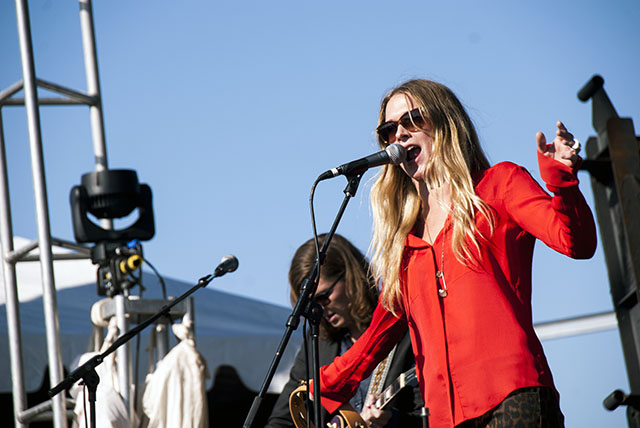
Wild Belle's Natalie Bergstrom. (Photo credit: Chicagoist/Lizz Kannenberg)
The crowd immediately thinned out after Hogan's set—from my eye I estimated at least 40 percent of the crowd left the stage area and parking lot—which meant the stragglers had ample room to catch The Corin Tucker Band. The influential former Sleater-Kinney and Heavens to Betsy guitarist-singer fronted a tight band including veteran drummer Janet Lund (Unwound, Hungry Ghost), guitarist/keyboardist Seth Lorinczi and touring bassist Dave Depper that took to the stage seemingly trying to play louder than the Wacos. Tucker and Lorinczi traded clean, crisp leads while Lund provided harmony vocals in addition to powerful rhythms. At points in the set I could close my eyes listening to Tucker singing and almost wonder if she’s been listening to Wild Flag, the “supergroup” that features her former Sleater-Kinney bandmate Carrie Brownstein.—CS
By this stage in the festival Tim Tuten found his groove with his introductions and managed a wonderful stream of consciousness that tied together Langford, Hogan, Mavis Staples, the Wednesday jazz nights at Hideout and Wild Belle. The mutual connection between the latter two is saxophonist/keyboardist Elliot Bergman. Wild Belle was easily the breakout act of the festival and showed why they’re poised to be The Next Big Thing in music come 2013. Their musical template is simple—a mélange of trip hop, ska, Afrobeat and the vocals of Bergman’s sister Natalie. 23-year-old Natalie Bergman’s vocal style owes a lot to reggae and ska in the phrasing, but her tone draws comparisons to British soul singers like Amy Winehouse and Alice Russell. Her stage presence is still developing; right now she’s still learning how to work a crowd. If the response from the Block Party attendees is a gauge, Natalie Bergman is on a fast learning curve.--CS
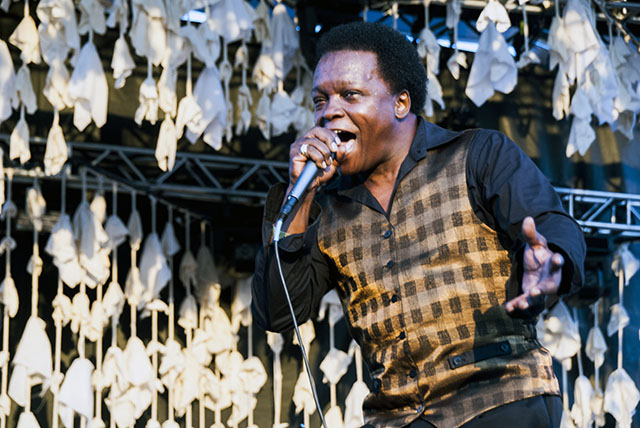
Lee Fields works the crowd. (Photo Credit: Chicagoist/Lizz Kannenberg)
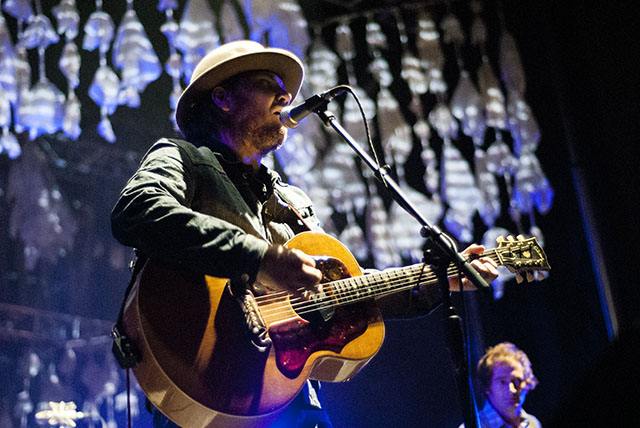
Wilco's Jeff Tweedy. (Photo Credit: Chicagoist/Lizz Kannenberg)